Published Sep 12, 2017
Jason Isaacs Talks Discovery, Genre Roles & More
Jason Isaacs Talks Discovery, Genre Roles & More
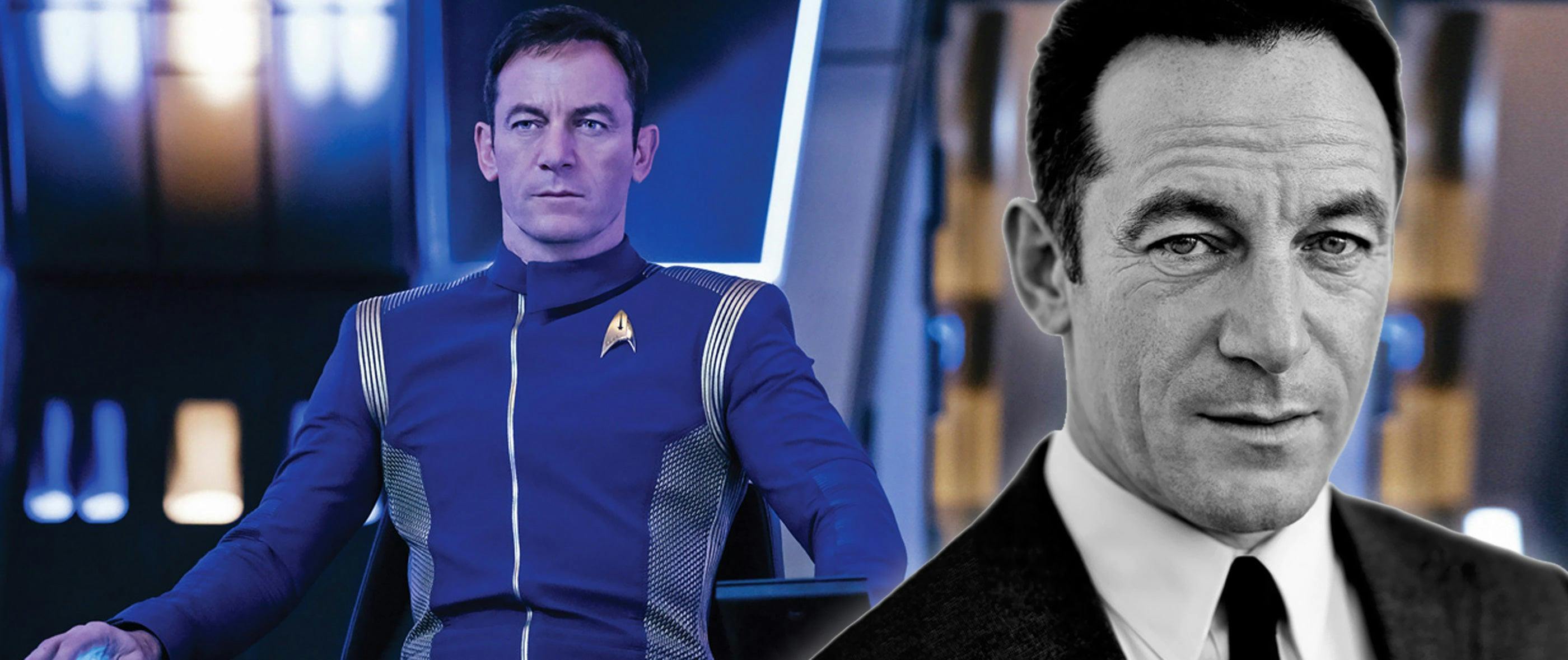
Jason Isaacs’ very long list of genre credits includes several Harry Potter films, Dragonheart, The OA, A Cure for Wellness, Event Horizon, Peter Pan, Armageddon, Awake and more. To that list, the respected British actor now adds Star Trek: Discovery, which will debut later this month. Isaacs plays Captain Gabriel Lorca of the U.S.S. Discovery, who leads a disparate crew that includes Michael Burnham (Sonequa Martin-Green). StarTrek.com recently ventured to Toronto and joined a small handful of other journalists for roundtable conversations about Discovery with the show's cast. Isaacs was talkative, but coy, serious, but funny as hell. Here’s what he had to say:

Let’s talk about the tone of Discovery. The Star Trek I saw when I was young was not very action-packed. There was action, but not much. What’s the balance in Discovery?
We have action. Obviously, the trailers are action-heavy because that's what you do in trailers, but that's not representative of the show. One of the great differences, and I think joys, of this version of Star Trek is it's a 15-hour unfolding narrative, like a novel, and the relationships can take twists and turns and they're dug into much more deeply. And it's far more about how we are with each other and what and who we are with each, other than it is about things blowing up. There's actually… not that there isn't some dynamic stuff and kinetic stuff, but it's mostly, as always, about moral dilemmas, and “What would I do if I was that person in this tricky situation?”
What's your sense of Lorca? It seems like he wants to win, that maybe he's not on a voyage of discovery…
Remember, this is 10 years before the place that we get to when Kirk sets out the Prime Directive. The Federation hasn't evolved at that stage yet. This is a time of war and time of crisis. You need to deal with people firing at you before you can work out what songs you want to sing around the camp fire. (laughter) He's the right guy to be in charge in a difficult time like that. But, again, I often come back to the same answer. I'm so sorry you'll have to distill it, but one of the luxuries you get when you tell a story over 15 hours is that nobody can be defined in a particular way. The press release has a paragraph about each of the characters, but, actually, which any one of us around the table could be defined by any sentence or two sentences? We're different day to day, week to week, depending on what's going on in our life that day. He changes, and he changes the way that he is and who is and how he is and his relationship with people changes. And I'm not sure that, like any well drawn character in narrative fiction, you can define him that easily. Or any character in real life.
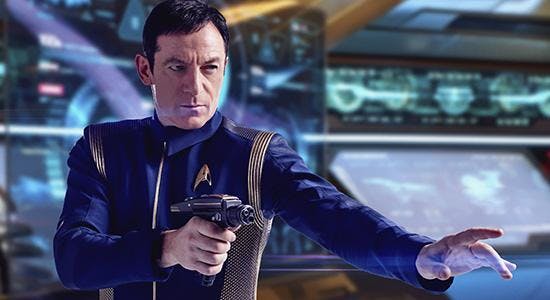
What interests you most about him?
That aspect, the fact that I wasn't playing the same color over and over again, that there were hidden depths to this man, that he was going to react in surprising ways in different situations, that he had maybe other agendas at certain points with people that were... that they knew about themselves or they didn't know about themselves. He's in denial about certain things. That he was recognizably human, and that it was a story born out of our times to tell of our times, these very troubling, dark times we live in, divisive times we live in. And that it wasn't trying to retread anything. I didn't feel like I was filling the gap between adverts. I felt like it was something that would hold your interest round a camp fire.
Star Trek is a big franchise, really beloved. You recently said you don't mind outraging hardcore fans, which outraged hardcore fans. Do you feel pressure about being in a show like this?
Well, first of all, the word franchise means a thing that sells burgers or sells action figures or lunch boxes. I'm the storyteller. So, I don't think about anything else, but I think about telling stories. And what I actually said, it was a slight misquote, which is a shame, because I do like the controversy, but actually it was a misquote... What I said, I'm hoping we're telling stories that will attract a whole new generation of people who are facing a whole new generation of difficulties, and I wasn't or don't particularly care about attracting the diehard fans, because they're going to watch anyways, because that is the definition of a diehard fan (laughs). They'll be watching.
And most people, it was a huge outpouring of support for saying that, but a couple of voices -- because people like to draw attention -- there's always someone who wants to put their hand up in a crowd and say something stupid. And, a couple people poured out hatred and vitriol at me. "If you don't care about us, you can go f--k yourself." But, actually, even that stuff is just a sign to me of how much people care and how much people love this show. And most of the series that came, at their time, had their detractors. They're now much-beloved parts of canon. And I've no doubt this will be, too.
But what people will discover when they watch the show, if they watch the show, is it's been made by Trekkies. You don't get any more deep-core Trekkie than Akiva (Goldsman), who is the executive producer of this, who was at the very first Star Trek convention. And so, there's people obsessed with canon in the writer's room. So, all I meant was that I don't think about any of that stuff, because I couldn't go to work if I felt like the ghost of Bill Shatner and Patrick Stewart were breathing down my costume (laughter), and that there were 20 million people watching to see whether I cross my legs or press the left button or the right button. So, I try and forget about all of that stuff. I even try and forget what the people in Los Angeles were thinking when they wrote it, and I just try to tell the story in the moment. That's all.
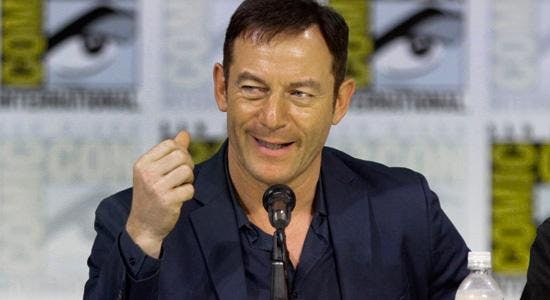
How aware of Star Trek were you prior to joining the Discovery cast?
I grew up with Star Trek. It's in my DNA. Oh, my God, yeah. It's the landscape of my childhood. My family and I, all we ever did together - it's a savage indictment of the cultural desert I was raised in, but anyway (laughter) - all we ever did was watch television. That's what we did. We watched television. When we weren't playing football, because I come from Liverpool now with three brothers, we watched television. We crammed ourselves into the smallest room in the house. We always had a slightly nicer room with that plastic on the furniture in case -- I've no idea who -- the Queen or President came to visit, but they never did... But we all lived in the smallest room, crammed on the sofa, watching television. And we fought, viciously, and I mean physically, about what channel we were going to watch. There weren't that many channels when I was a kid. There was two, then there was three, and finally there was four. And then remote controls came out, which at first were a click, and we fought over the remote control.
The only time we didn't fight was when Star Trek was on. That's what we all wanted to watch. And I must have seen those Original Series episodes, because they were repeated dozens of times. They were an iconic part of my childhood. I mean, I spent, Malcolm Gladwell's 10,000 hours trying to levitate a cup of coffee, because in "Where No Man Has Gone Before" Kirk's crewmate starts by levitating a cup of coffee and becomes a god and has all these godlike powers. I can't tell you how long I've tried. There's a few times I've thought maybe I saw a tremor or a cup move (laughter). Could have been the window shutting; I don't know.
And then, also, I had nightmares over Grup disease. Grup disease is… remember that episode? "Miri" is the episode where, when you hit adolescence, you get a wasting disease that is actually purple plasticine. Little did I know as a kid, it's an allegory for the horrors of puberty. But, to me, it's just a disease that kills you, which is what's great about Star Trek, when it works on many different levels. So, no, it was a huge part of my childhood, and when I heard it was being done again, I wanted no part of it. No interest in a reboot or re- or doing a horribly diluted version of something that was so brilliant. And you couldn't ever match what Bill Shatner and Leonard Nimoy did together. That relationship was, the core of it, was brilliant. But then, I set up a Skype, a slightly reluctant Skype, with these guys, and they had a great story to tell. They had a great character to play. And so, I shrugged off any of the yolk of the past and just jumped in to play this, to do this story.
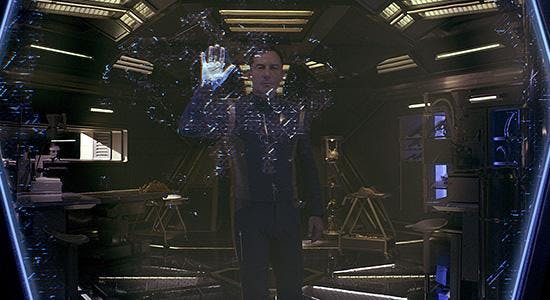
Spock and Kirk played off each other and brought out the best in each other as characters. Does your character have someone like that?
No. No. No. First of all, the show is Michael Burnham's show. That's one of the things that makes it good. It's a different perspective. It's from the crew. You're not in the offices with the generals. You're in the trenches with the privates. And it's a very different perspective from her perspective. She's lower-rank. She's lower down the totem pole, and that gives you a totally different experience of these wars and the conflicts in them. And so, A) there isn't, and B) I have a relationship with everybody. She has a relationship with everybody. The central relationships are hers with people. But he's more of a... He's not that guy. He keeps his cards most close to his chest, Lorca. He's a wartime leader, and too much fraternization, too much open vulnerability would not help people fight.
It reminded me in some ways… He's not like this. I don't make a comparison between the characters, but I played Mike Steele in Black Hawk Down, and I had very different, conflicting reports of who and how he was like from the soldiers with him, under him, in charge of him, from the Delta guys who had conflicts with him. But, definitely, it was true of him that he felt like, in order to keep his troop disciplined in line, there had to be a slight level of distance between him and his troops, which the Delta guys didn't have. And he got extremely worried when the Rangers started to display a lack of discipline. He thought it would kill them in theater. And in some ways, I think Lorca has that quality.
Can you give us some sense of his relationship with Burnham?
No. (laughter).

Is he a mentor? Does she look up to him?
Why would you want me to spoil the story for you?
Well, there’s the interaction in the Discovery trailer…
I see great potential in her, and I have an interest in her, but that may be slightly, hopefully, interesting, enigmatic for people and wonder why there is. And while it's not hard to wonder what it is… You look at her, she's incredibly capable. She's an incredibly capable character. She's raised on Vulcan, and she gets a bit of a second chance under my wing. But, she's a charismatic person on and off camera, Sonequa, and so everyone is slightly drawn into her web as well.
Going back to the tone, the other thing about The Original Series is the humor. Do we have anything like that in the new...
Definitely.
Because the trailers are very dark, gritty and modern.
They're not dark. It's kind of dark. I remember people were saying that Harry Potter got dark in the third one. No, it was just, you met the dementors. They were scarier than the people you met before. It became darker, because the story, written by Rowling, evolved to… but I don't think it's darker. It's just that they're getting older. The kids are getting older, and they're encountering more difficult things. Yes, there's definitely (humor in Discovery). First of all, Rainn Wilson, that episode, I defy you not to laugh at Rainn Wilson. It was very hard not to laugh at Rainn Wilson on set, extremely difficult. But there is at least one character who is... she's not comedy relief, because she's utterly brilliant in it, but she’ll become a fan favorite very, very quickly, because she's hysterically funny -- wittingly and unwittingly. And then, also, out of situations of enormous stress and conflict comes gallows humor, and there's definitely some of that in there, too. There's dry humor in it. It's not as camp as The Original Series. The Original Series is camp; not as camp, but it was made in the same era that Batman was made. There's a kind of knowing wink. We don't wink knowing the audience because the audience is expecting something, I think, different, than 21st century audiences.
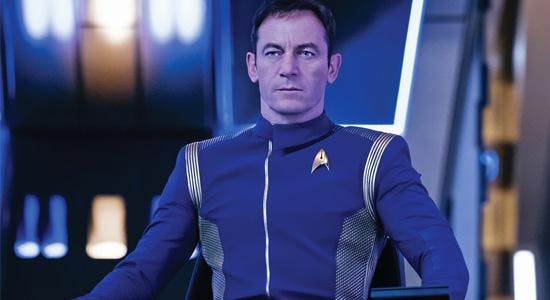
You've put on different uniforms over your career. What does it mean to put on the Starfleet uniform?
Enormous pain and no lunch. (laughter). It was like putting on an external gastric bypass. I felt like trying to get into it was like someone making my body into a balloon animal. So, it meant that. I felt much more vulnerable, because I've worn uniforms with Kevlar before. I've played a lot of soldiers, a lot of defense sort of armor. And these are (futurist) fighting uniforms. And, well, you're not fighting hand to hand. So, they're very, very thin. I don't know if anyone goes skiing, or does sports things, you know that wicking material. But, an advancement of those things.
You really feel very vulnerable and very naked. You don't feel like you're ready to fight. And there's no pockets and no props to play with. As an actor, there's no Meryl Streep peeling oranges scene. There's nothing to do with your hands (laughter). And I did take advice. I looked around. Patrick (Stewart), obviously, tugged his jacket the whole time, because it turns out in the future there's no creases, either. If you watch very carefully, there's an obsession, an obsession where nobody ever crinkles. Jonathan Frakes said to me, "Do whatever you like with your hands, but don't put them on your hips. Just trust me. Trust me, I tried it." So, I've avoided that judiciously.
But there's no question that it's part of it. You put it on, it's a remarkable look. And she's a brilliant designer, Gersha Phillips, but God knows, the scripts… We’ll suddenly have a whole new world and a whole new species and (need all) new clothes, and then she comes up with stuff. But I know that the cost of the uniforms went through many, many iterations before they settled on what they came up with. I was thrilled that it wasn't that kind of baby diarrhea mustard that they had in The Original Series (laughter). Totally narcissistic that I was thrilled that they were blue. And relieved, of course, that I didn't have a red shirt. So, yeah, they are what they are. We work out with them. We do sports and we have a gym there and have a table tennis table. So, you can move in them, but you can move mostly because they're like body paint, they're so tight. There were many discussions about making sure they weren't so tight and so revealing that it became a very different show altogether.
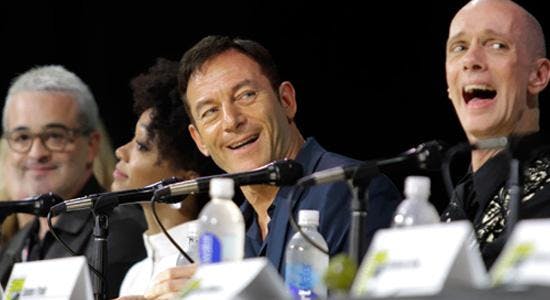
You've done a lot of sci-fi, horror and fantasy…
Event Horizon was 22 years ago!
Exactly. There’s Harry Potter, The OA, Event Horizon, Soldier, and on and on. What do you enjoy about genre fare?
Do you know, I just… It sounds ridiculous, but I like… I love telling stories, and fantasy is a prism through which we can often examine our real lives more honestly than (through) realistic drama. Sometimes, we feel free of our partisan politics or other kind of self-conscious traits when we're examining our lives and our politics and our world through the prism of fantasy. Things can be made clearer, and we can see things both at a distance and in a way that's more intimate. But that's true of the genre.
But, for me personally, I just like well-written characters that I believe. And since my job is make-believe, it's… Actually, it's not true. I was going to lie. I was going to say that ... The truth is I like all of it. I love realistic dramas, I love fantasy. I like things that live beyond the credits. That's all. I don't like telling stories that are a great journey when you watch something entertaining, and then the credits roll and you go "Let's read." I like to do “What would I do?” Stuff that provides fodder for conversation. And I think if we do (Discovery) right, it will do that. I know, God knows, that The OA has spawned a gazillion online hours of people theorizing about what should and shouldn't be, but also people come up to me and want to talk about spirituality and death. Many of the things I've been in have been lucky enough to be things that start a conversation. So, that's really all I care about. Fantasy starts lots of conversations when it's done right.
Star Trek: Discovery will debut September 24 on CBS All Access in the U.S. and Space Channel in Canada. The series will premiere on Netflix in the rest of the world on September 25.




